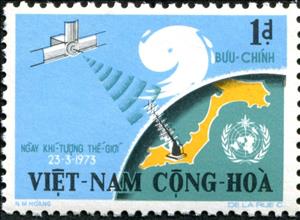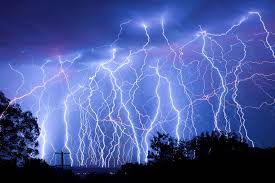Stamp: Centenary of World Meteorological Organisation WMO (Vietnam, South 1973)
Centenary of World Meteorological Organisation WMO (Vietnam, South 1973)
23 March (Vietnam, South ) within release World Meteorological Day goes into circulation Stamp Centenary of World Meteorological Organisation WMO face value 1 South Vietnamese đồng
| Stamp Centenary of World Meteorological Organisation WMO in catalogues | |
|---|---|
| Michel: | Mi: VN-S 525 |
| Stamp Number: | Sn: VN-S 447 |
| Stanley Gibbons: | Sg: VN-S 437 |
Stamp is square format.
Stamp Centenary of World Meteorological Organisation WMO it reflects the thematic directions:
Meteorology is a branch of the atmospheric sciences (which include atmospheric chemistry and physics) with a major focus on weather forecasting. The study of meteorology dates back millennia, though significant progress in meteorology did not begin until the 18th century. The 19th century saw modest progress in the field after weather observation networks were formed across broad regions. Prior attempts at prediction of weather depended on historical data. It was not until after the elucidation of the laws of physics, and more particularly in the latter half of the 20th century, the development of the computer (allowing for the automated solution of a great many modelling equations) that significant breakthroughs in weather forecasting were achieved. An important branch of weather forecasting is marine weather forecasting as it relates to maritime and coastal safety, in which weather effects also include atmospheric interactions with large bodies of water.
A satellite or artificial satellite is an object, typically a spacecraft, placed into orbit around a celestial body. They have a variety of uses, including communication relay, weather forecasting, navigation (GPS), broadcasting, scientific research, and Earth observation. Additional military uses are reconnaissance, early warning, signals intelligence and, potentially, weapon delivery. Other satellites include the final rocket stages that place satellites in orbit and formerly useful satellites that later become defunct.


